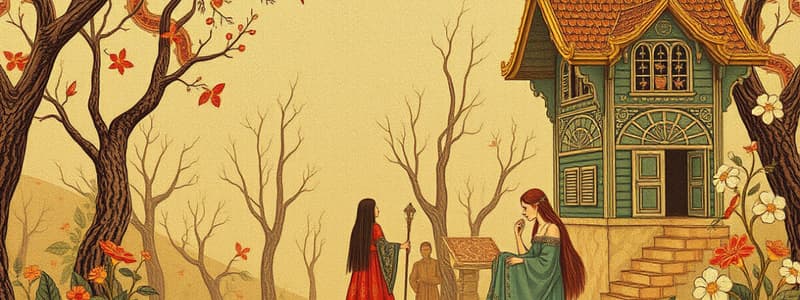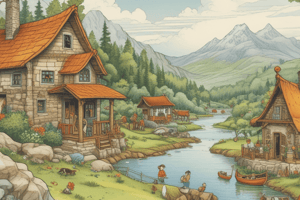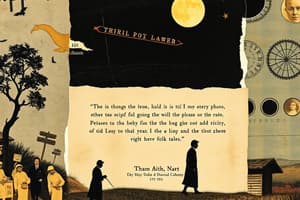Podcast
Questions and Answers
What best describes the nature of folk cultures in terms of stability and variability?
What best describes the nature of folk cultures in terms of stability and variability?
- Folk cultures are highly variable through time but stable across space.
- Folk cultures are stable through time but highly variable across space. (correct)
- Folk cultures change quickly throughout different regions and remain constant within some groups.
- Folk cultures are stable across all regions but vary within small groups.
How does the transmission of folk culture primarily occur?
How does the transmission of folk culture primarily occur?
- Through oral communication and participation in cultural activities. (correct)
- By formal education systems that teach folk practices in classrooms.
- By electronic media sharing and mass communication.
- Through written texts that are passed from one generation to another.
What is a consequence of the local resource usage in folk cultures?
What is a consequence of the local resource usage in folk cultures?
- Folk cultures are likely to innovate and create entirely new forms of customs.
- Folk cultures often produce distinctive traditional practices tailored to local environmental conditions. (correct)
- Folk cultures tend to develop similar cultural practices regardless of geography.
- Folk cultures frequently adopt practices from dominant urban cultures.
What characteristic is shared among folk cultures regarding their development over time?
What characteristic is shared among folk cultures regarding their development over time?
What is implied about the food production practices in folk cultures?
What is implied about the food production practices in folk cultures?
What distinguishes craftsmanship in folk culture from factory work?
What distinguishes craftsmanship in folk culture from factory work?
What role does public schooling play in the decline of folk culture?
What role does public schooling play in the decline of folk culture?
Which of the following factors contributes to the pressure to acculturate and assimilate away from folk cultures?
Which of the following factors contributes to the pressure to acculturate and assimilate away from folk cultures?
How does the internet influence popular culture according to the content?
How does the internet influence popular culture according to the content?
What is the primary characteristic of popular culture as described?
What is the primary characteristic of popular culture as described?
Folk cultures are predominantly found in large, diverse populations.
Folk cultures are predominantly found in large, diverse populations.
The Slow-food movement emphasizes fast food consumption over local ingredients.
The Slow-food movement emphasizes fast food consumption over local ingredients.
The term 'folk' originally referred to a group of people or clan.
The term 'folk' originally referred to a group of people or clan.
Popular culture thrives on marketing and requires constant reinvention to maintain consumer interest.
Popular culture thrives on marketing and requires constant reinvention to maintain consumer interest.
Folk customs change rapidly and are highly influenced by outside cultures.
Folk customs change rapidly and are highly influenced by outside cultures.
Gemeinschaft refers to life in larger societies, while Gesellschaft pertains to small community living.
Gemeinschaft refers to life in larger societies, while Gesellschaft pertains to small community living.
Folk cultures rely solely on imported resources for their daily needs.
Folk cultures rely solely on imported resources for their daily needs.
The production of alcohol and other psychoactive substances has been a recent development in folk cultures.
The production of alcohol and other psychoactive substances has been a recent development in folk cultures.
The process of knowledge transmission in folk cultures primarily occurs through formal education.
The process of knowledge transmission in folk cultures primarily occurs through formal education.
Public schooling and an official language serve as tools for promoting national values, impacting folk cultures.
Public schooling and an official language serve as tools for promoting national values, impacting folk cultures.
Flashcards are hidden until you start studying
Study Notes
Folk Culture
- Folk culture evokes traditional customs, dances, and music, often associated with the past and festivals.
- Origin of the term "folk" traces back to Old Norse, English, and Germanic roots, referring originally to armies, clans, or groups.
- Identifies distinct cultural practices shared among homogeneous groups, often tied to geographic landscapes.
- Folk customs remain stable over time but exhibit variability across different regions; they change slowly.
- Movement of folk culture occurs through relocation diffusion as groups migrate, bringing cultural items and ideas with them.
- Knowledge transmission happens through direct interaction or participation until mastery is achieved, such as cooking or building.
- Functional adaptations to local resources result in similar architectural styles and agricultural practices within culture areas.
- Folktales and folklore serve as foundational myths and cautionary narratives.
- Holidays like Mardi Gras disrupt daily life, providing cultural relief and opportunities to challenge societal norms.
- Folk cultures historically utilized psychoactive substances for rituals which have largely been commercialized in modern times.
- Revival of folk appreciation through cultural tourism and movements like Slow Food aims to reconnect with traditional practices.
- Famous efforts to record folk traditions include John Lomax's documentation of folk songs and narratives in early 20th-century America.
- The craftsmanship of folk production differs from factory work, emphasizing knowledge and relationship to materials versus industrial disconnection.
Changing Cultural Landscape
- Decline of folk culture confronts popular culture due to nationalistic state policies affecting minority lifestyles.
- Economic changes, such as rural community shrinkage since the Industrial Revolution, hinder the reproduction of folk customs.
- Infrastructure developments (roads, internet) facilitate the diffusion of popular culture while obstructing local practices.
- Cultural interchange in places like the U.S. results in transformation as immigrants bring popular cultural influences, complicating traditional folk identities.
Popular Culture
- Defined by commerce, popular culture revolves around marketing and consumption patterns.
- Individuals engage with ubiquitous products from global supply chains, leading to homogenized lifestyles disconnected from local resources.
- Constant evolution in popular culture emerges through fashion shifts driven by the need for companies to sell new items.
- Commercialization of holidays reflects a growing trend where cultural celebrations become opportunities for consumerism.
- Technologies like the internet significantly accelerate the diffusion of popular culture, resulting in cultural lag where innovations take varying times to reach different locales.
- Popular culture is stable across geographic spaces but exhibits rapid changes over time.
Global Culture
- Globalization integrates the world into a single economic framework, leading to emerging global cultural expressions.
- Differences in product authenticity are prominent; many international fast-food chains transform local cuisines into commodities.
- Cultural attributes are commodified for mass markets, often diverging from their original forms.
- Transnational corporations dominate popular culture production, with a few major entities controlling substantial shares of the market.
Resistance to Popular Culture
- Pushback against the corporatization and homogenization of cultural practices emerges from both leftist and rightist views on globalization.
- Opposition often centers on retaining state sovereignty against perceived cultural erasures of local identities.
- Resistance includes movements advocating for local food sourcing, traditional practices, and fair-trade products, such as the Slow Food movement.
Summary
- Culture encompasses a wide spectrum of human behaviors, historically revolving around small groups practicing folk traditions.
- Transition from folk culture to popular culture marks profound societal changes, facilitated by technological advances and globalization, culminating in the emergence of a global culture characterized by shared practices.
Folk Culture
- Folk culture evokes traditional customs, dances, and music, often associated with the past and festivals.
- Origin of the term "folk" traces back to Old Norse, English, and Germanic roots, referring originally to armies, clans, or groups.
- Identifies distinct cultural practices shared among homogeneous groups, often tied to geographic landscapes.
- Folk customs remain stable over time but exhibit variability across different regions; they change slowly.
- Movement of folk culture occurs through relocation diffusion as groups migrate, bringing cultural items and ideas with them.
- Knowledge transmission happens through direct interaction or participation until mastery is achieved, such as cooking or building.
- Functional adaptations to local resources result in similar architectural styles and agricultural practices within culture areas.
- Folktales and folklore serve as foundational myths and cautionary narratives.
- Holidays like Mardi Gras disrupt daily life, providing cultural relief and opportunities to challenge societal norms.
- Folk cultures historically utilized psychoactive substances for rituals which have largely been commercialized in modern times.
- Revival of folk appreciation through cultural tourism and movements like Slow Food aims to reconnect with traditional practices.
- Famous efforts to record folk traditions include John Lomax's documentation of folk songs and narratives in early 20th-century America.
- The craftsmanship of folk production differs from factory work, emphasizing knowledge and relationship to materials versus industrial disconnection.
Changing Cultural Landscape
- Decline of folk culture confronts popular culture due to nationalistic state policies affecting minority lifestyles.
- Economic changes, such as rural community shrinkage since the Industrial Revolution, hinder the reproduction of folk customs.
- Infrastructure developments (roads, internet) facilitate the diffusion of popular culture while obstructing local practices.
- Cultural interchange in places like the U.S. results in transformation as immigrants bring popular cultural influences, complicating traditional folk identities.
Popular Culture
- Defined by commerce, popular culture revolves around marketing and consumption patterns.
- Individuals engage with ubiquitous products from global supply chains, leading to homogenized lifestyles disconnected from local resources.
- Constant evolution in popular culture emerges through fashion shifts driven by the need for companies to sell new items.
- Commercialization of holidays reflects a growing trend where cultural celebrations become opportunities for consumerism.
- Technologies like the internet significantly accelerate the diffusion of popular culture, resulting in cultural lag where innovations take varying times to reach different locales.
- Popular culture is stable across geographic spaces but exhibits rapid changes over time.
Global Culture
- Globalization integrates the world into a single economic framework, leading to emerging global cultural expressions.
- Differences in product authenticity are prominent; many international fast-food chains transform local cuisines into commodities.
- Cultural attributes are commodified for mass markets, often diverging from their original forms.
- Transnational corporations dominate popular culture production, with a few major entities controlling substantial shares of the market.
Resistance to Popular Culture
- Pushback against the corporatization and homogenization of cultural practices emerges from both leftist and rightist views on globalization.
- Opposition often centers on retaining state sovereignty against perceived cultural erasures of local identities.
- Resistance includes movements advocating for local food sourcing, traditional practices, and fair-trade products, such as the Slow Food movement.
Summary
- Culture encompasses a wide spectrum of human behaviors, historically revolving around small groups practicing folk traditions.
- Transition from folk culture to popular culture marks profound societal changes, facilitated by technological advances and globalization, culminating in the emergence of a global culture characterized by shared practices.
Studying That Suits You
Use AI to generate personalized quizzes and flashcards to suit your learning preferences.




